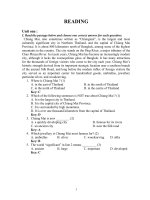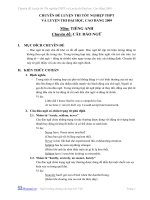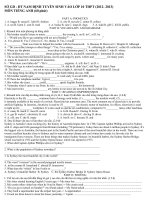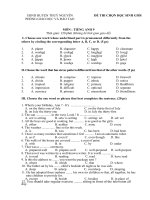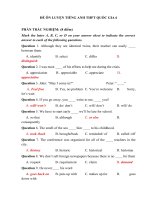Đề ôn thi tieng anh
Bạn đang xem bản rút gọn của tài liệu. Xem và tải ngay bản đầy đủ của tài liệu tại đây (87.21 KB, 8 trang )
Đề ôn thi đọc 1
READING PAPER
PASSAGE 1: 1-10
TEACHING IN INDIA
by Elise Cooper
‘Elise in India’. ……..
1. How did Elise apply for the teaching post in India?
(C.) Through an international organization
2. What can be inferred about Elise according to the text?
(B.) She is not Indian.
3. How did Elise and her teammate, Lucy, feel when they were on their way to the children’s home?
(A.) anxious
4. Elise and Lucy were responsible for teaching the following lessons except
(B.) history
5. According to the text, the pupils in each class that Elise taught were
(D.) at different ages
6. According to Elise, what do Indian pupils and schoolchildren everywhere have in common?
(C.) Imperfect behavior in class
7. The most enjoyable time for both teachers and the children was
(C.) after school
8. What does “This” in line 18 refer to?
(D.) the way to make the lessons more attractive
9. Which adjective best describes the job of getting pupils’ attention to the general knowledge lessons?
(A.) challenging
10. Which of the following words would the author most probably use to describe her experience in India?
(D.) useful
PASSAGE 2: 11-20
FORECASTS THAT SAVE LIVES
Being able to forecast the weather isn't just to do with informing people about whether or not they can
go to the beach or have a picnic. When there are going to be severe weather conditions, the ability to prepare for them can
be a matter of life or death. (A) …………………………….
11. According to the text, weather forecast is exceptionally crucial when the weather is becoming
(B.) severe
12. What does “them” in line 3 refer to?
(D.) extreme weather conditions
13. Hurricanes in the Indian Ocean is usually referred to as
(D.) cyclones
14. Which is the least active part of a hurricane? (B.) the eye
15. At which point is the hurricane most dangerous?
(D.) when it moves onto to land
16. The word “catastrophic” in line 21 can be best replaced by
(B.) disastrous
17. Saffir-Simpson Hurricane Scale is used to
(A.) evaluate the power of a hurricane
18. Being able to forecast hurricanes has
(C.) reduced the number of people killed.
19. In which space (marked (A), (B), (C) and (D) in the passage) will the following sentence fit?
(A.) (A)
20. According to the text, the forming of a hurricane starts
1
(D.) in the ocean
PASSAGE 3: 21-30
AGAINST ALL ODDS
Why do some pople feel compelled to do the craziest things, while most of us are happy to sit on the sofa and watch their
exploits on TV? Robin Styles ponders this question.
Generally, we love to watch someone's bravery and drama ………………………
21. According to the text, most people would prefer to have
(A.) a comfortable life without risk..
22. What does the word “friends” in line 13 refer to?
(D.) the scorpions
23. Kanchana Ketkeaw did not suffer serious injury from the scorpions because
(D.) her body has become used to the poison.
24. The writer of the text believes that Kanchana Ketkeaw.
(C.) did not perform only for her country.
25. When did Lynne Cox first discover that she enjoyed swimming in difficult conditions?
(B.) when she was nine
26. Why is Lynne Cox particularly well suited to what she does?
(D.) Unusually, the fat below her skin is like that of a seal.
27. In both of the expeditions mentioned, Sir Ranulph Fiennes.
(B.) endured very severe weather conditions.
28. Sir Ranulph Fiennes uses the memory of his father
(A.) to give him strength at difficult moments.
29. Adventurers find that they cannot stop taking risks because
(C.) they love the feeling it produces..
30. According to the text, most risk-takers are
(C.) persistent and decisive
PASSAGE 4: 31-40
GOOD VIBRATIONS
There is nothing to suggest that Evelyn Glennie is profoundly deaf. She insists that her deafness is
irrelevant to her musicianship, but there is no doubt that her obvious handicap has turned a remarkable career into a
miraculous one…………………………
31. What does the phrase ‘obvious handicap’ (line 3) mean in this context?
(D.) an apparent physical disability
32. The word “it” in line 4 refers to
(A.) Glennie’s hearing
33. What added to Glennie’s determination not to give up on a musical career?
(A.) her doctor’s advice
34. Glennie wanted to be a solo performer because
(C.) She liked praise and attention
35. Which type of instruments do drums belong to?
(C.) percussion
36. Why was music such a good choice of career?
(A.) It enables her to speak well.
37. Glennie thinks that one of the things that make her style unique is
(B.) her deafness
38. Why does Glennie not like being compared with others?
(B.) She criticises herself already
39. The library she set up is most probably beneficial to
(D.) other musicians
40. What would be the most suitable title for this extract?
(D.) Overcoming a severe disability
2
Đề ôn thi đọc 2
READING PAPER
PASSAGE 1 – Questions 1-10
TV REVIEW
Lucy Chang tells you what’s new (and not so new!) on your screens this summer.
I always look forward to this time of year, and I’m always disappointed! ……………………..
1.At this time of year
(C) the writer hopes for something that never happens.
2.How does the writer describe the current programmes on SuperTV?
(D).disappointing
3.What does 'They' in paragraph 1 refer to?
(A).SuperTV
4.The writer says that Staff Room will probably
(A). be successful. .
5.Characters of the show Staff Room are
(B).teachers
6.The word “hilarious” in paragraph 2 can be best replaced by
(A).amusing
7.The writer thinks that Joke-a-Cola is now 3
( C).funnier than before..
8.Because of the various choice of entertainment
(D).programmes have to be more exciting.
9.The writer thinks that television
( C) could lose its popularity in the future.
10.Which of the following channels would the author most probably recommend viewers to watch?
(B)Channel 9
PASSAGE 2 – Questions 11-20
The reluctant hero
The most endearing thing about Aaron Green – ……………………………
11.According to the text, what does Aaron think about his job?
(B) It can’t make his life change.
12.The word “fascinating” in paragraph 1 can be best replaced by
(D) interesting
13.In the first paragraph, the writer suggests that he thinks Aaron
(D) has unrealistic ideas about what it’s like to be famous.
14. According to the text, when will Aaron’s latest film probably be released?
(B) next year
15.
The phrase “hasn’t gone to his head” (paragraph 2) suggests that Aaron
(A) doesn’t think much about his achievements.
15.
What does Aaron say about his last film?
(B)The plot is not as simple as it may appear.
16.
What makes the writer think that Aaron is a bit of a worrier?
(A) He avoids watching his own films.
17.
How did Aaron feel when playing a real-life person in his last film?
(D)highly responsible
18.
What does Aaron say about playing a real-life person on screen?
(C)He was concerned that the person might feel angry.
19.
According to the final paragraph, what do Aaron and the directors of
films have in common?
(D)the unwillingness to lose naivety
3
PASSAGE 3 – Questions 21-30
21.
21.
22.
23.
24.
25.
26.
27.
28.
29.
ADVERTISING – ART OR POLLUTION?
How many adverts do you think you’ll see today? 10? 30? ………………………….
What is the main point of the first paragraph?
(A) We see more adverts than we realise.
Yankelovich is
(C )A market research company
What do we learn about the writer's opinion of advertising in Tokyo in the second
paragraph?
( C) It seems excessive to him.
Why do advertisers see Tokyo as important?
( A). It sets trends which are often copied.
What does the writer mean by 'sets it apart' in paragraph 6?
(A)makes it seem individual and different
In the fourth paragraph, Roberta Calvino suggests that .
(C ) outdoor advertising extends beyond urban areas.
What does Roberta tell us about urban advertising in the sixth paragraph?
(D)It can lower our self-confidence.
What comparison does Roberta make between urban advertising and TV advertising?
( C)Urban advertising can have more impact.
What did the mayor of São Paulo do in 2007?
(A)He ordered the removal of more than ten thousand adverts.
What response did the mayor get when he removed advertising from Sao Paulo?
(D)Most of the people who lived in the city welcomed his decision.
PASSAGE 4 – Questions 31-40
31.
31.
32.
33.
34.
35.
36.
37.
38.
Until fairly recently explaining the presence of human beings in Australia……………………
According to the text, Aborigines arrived in Australia
(D)more than 45,000 years a go
What did the discovery of the skeleton show?
(C)Aborigines have been in Australia far longer than previously thought.
Which of the following statements is NOT true, according to the text?
(A) Australia has always been an island since people existed.
Why is it so surprising that Homo sapiens got to Australia?
(A).It required skills that people generally developed very much later.
What usually provides the explanation for the Aborigines' arrival in Australia?
(B).bad weather
This author is puzzled by how…
( C).enough people got there to found a settlement
Which word could replace 'staggeringly' in line 33 without changing the meaning?
(A).extraordinarily
What does the writer seem most surprised by at the end of this extract?
(D).the fact that so little attention is paid to this aspect of human history
In which space (marked (A), (B), (C) and (D) in the passage) will the following sentence fit?
In other words, for the first 99.7 per cent of its inhabited history, the Aborigines had Australia to themselves. They have
been there an unimaginably long time.
39.
What is the main point the writer is making in the last paragraph?
(D).The Aborigines were the only people in Australia for most of the time since it was settled.
4
Đề ôn thi Viết 1
WRITING TEST 2
đề
Trả lời
Dear Sam,
Viet Nam is a country with 54 ethnic minority groups so there are so many festivals throughout the
year. However, most festivals take place after Tet holiday which is the most important festival of
Kinh group. Tet festival, which is also called Lunar New Year Festival often falls between late
January and early February; it is among the most important holiday in Vietnam. Officially, the
st
nd
rd
festival includes 1 , 2 and 3 day in Lunar Calendar; however, Vietnamese people often spend
about nearly a month to celebrate this special event. It is to thank Gods for the
arrival of spring with a variety of blooming trees and flowers after a cold and harsh winter. Many
activities are organized to celebrate the festival. Many kind of traditional food are made to welcome
the festival.
I recommend you go to Vietnam on the Tet festival to learn about our culture. I will take you around
to see the festival.
Yours sincerely,
Đề ôn thi Viết 2
WRITING TEST 22
ĐÊ: I’d love to spend the summer working in your country. I think I could learn a lot! Do you think
it would help me improve my knowledge of your language?..........
Trả lời:
Dear Patrick,
It’s great to know that you are planning to come to my country.
I bet that your language will improve considerably after your time here as you have many
opportunities to practice it with local people. In my country, it is rare to see a foreigner doing parttime jobs in a restaurant or supermarkets but I suggest you work as a tutor. Many students want to
study language with native speakers and I can help you to organize some classes. Although the pay
is not very high, it is enough for your expenses here. About your accommodation, you can feel free
to stay in my house. You know you are always more than welcome at my place. Let me know about
your ideas. See you soon.
Your friend,
5
Đề ôn thi nghe 1
PART 1
Listening Part 1
1. How much is the car?
C. £3000
2. What’s Elena going to take to the party?
A. cola and pizza
3. Where will Susan buy her eggs?
D. on the farm
4. How does the man want his son to help him?
C. carry the ladder back
5. Which TV programme is on at nine o’clock tonight?
C. cartoon
6. What will the boy do first?
A. go to the library
7. Where will the girls meet?
C. at the ice-cream booth
8. Which chair does the man want?
A. with high a back and arms
Đề ôn thi nghe 2
PART 1
Listening Part 1
1. What have they forgotten?
B. camera
2. What time does the train go?
A. 06.15
3. How did the woman get to work?
C. by car
4. Where are the man’s shoes?
C. by the door with the other rubbish
5. What will Paul get at the shop?
C. a red pepper and carrots
6. How were they told to do their homework?
A. write it in the books
7. What did Helen buy?
D. sweater
8. How did the woman get to work today?
B. by taking a lift
6
Đề ôn thi nghe 1
PART 2
Listening Part 2
You will hear three different conversations. In each conversation, there are four questions. ............
Conversation 1. You will hear a student talking to a housing officer about living with a homestay family.
9. How long did YuichinI intend to live with a homestay family?
B. About sixteen weeks. .
10. Which course did she enroll?
C. Advanced English Studies.
.
11. What does the student particularly like to eat?
A. Seafood
12. When does the officer give the student her homestay details?
C. In the afternoon.
Conversation 2. You will hear an interview with a representative of a wildlife park called Paradise Wildlife Park.
13. How is the Park described?
C. It is involved in Project Life Lion since 1994.
14. What did they do to control environmental issues?
C. The park has created its own Environmental Management System.
15. What is the purpose of adopting an animal that he mentioned?
B. It is to mark a special occasion not only for yourself but also for a friend or loved one.
16. What is true about Experience Days?
D. The Experience Days are a gift for someone who is 12 or over.
Conversation 3. You will hear an interview with Sophie Morrison, a translator.
17. At present, which subject is she specializing in as a translator?
C. Law.
18. Which, according to Sophie, are the most things to translate?
A. Cultural references.
19. Where does Sophie get most of her work?
C. Through translation agencies.
20. Sophie believes that in the future
B. More languages will need to be translated.
Đề thi nghe 2
PART 2
Listening Part 2
You will hear three different conversations. In each conversation, there are four questions. .....................
Conversation 1. You will hear a conversation between Matthew and his mother
9. Why doesn’t his mother lend him her car?
C. Because she needs the car
10. What will Matthew do after class?
C. help his friend
11. When is his mother’s meeting?
C. Wednesday 9th
12. What is true about the conversation?
D. This problem is due to his mother’s mistake
Conversation 2. Listen to an interview about indoor skydiving
13. Where does he play this sport?
A. in a wind tunnel
14. What is the name of the sport center?
C. Runaway
15. What is it like to be in the wind tunnel?
B. you stay afloat
16. How dangerous is this sport?
B. You suffer from small injuries
Conversation 3. Listen to a conversation between a director of study in an English language center and a student
representative talking about their self-access center.
17. What are the main topic of the conversation?
B. to know what to do with the center
18. What are the main problem of the center?
D. lack of computers
19. The director complains that students are using computer for
C. reading their emails
20. What are they likely to do with the center?
B. purchase more equipment
7
Đề ôn thi nghe 1
PART 3
Listening Part 3
You will hear three different talks or lectures. In each talk or lecture there are five questions. ............
Talk/ Lecture 1: You will hear a man talking about the weather.
21. Which word can be used to describe weather in Britain?
C. random
22. What do anticyclones often bring?
C. fine weather
23. Where are the violent storms common?
D. in tropical climates
24. What can we say about the weather forecasting?
B. It has been done for a long time
25. According to a traditional rhyme, if there is a red sky at night:
A. the next day will be fine
Talk/ Lecture 2: You will hear a man talking about books and his experience in reading books.
26. The author probably read "Where the Wasteland Ends: Politics and Transcendence in Postindustrial Society":
B. in 1982
27. When he was a boy, the author:
D. read enthusiastically
28. Students at university used to spend the evenings:
D. the author doesn't say how they spent the evenings
29. At work, the author:
B. didn't have to read books
30. The author:
A. hardly read a book for ten years
Talk/ Lecture 3: You will hear a woman talking about fashion.
31. Designers put their clothes…
A. in fashion shows
32. Why do designers like famous people to wear their clothes?
B. because the clothes may become fashionable.
33. Clothes companies . . .
A. study fashion shows.
34. The new fashion this year…
C. has lots of colours and styles.
.
35. Anna Sui is …
D. a new fashion designer.
Đề ôn thi nghe 2
Listening Part 3
You will hear three different talks or lectures. In each talk or lecture there are five questions....
Talk/ Lecture 1: You will hear a woman talking about SCUBA diving.
21. SCUBA diving…
C. has developed quickly.
22. What is not praised for SCUBA diving?
C. the safety of diving adventures
23. In which place do recreational divers choose to dive?
C. The North Sea in Britain
24. “The bends” is a condition…
B. caused by a quick rise to the surface.
25. Which information is TRUE about diving?
A. Diving through underground caves is more dangerous.
Talk/ Lecture 2: You will hear a woman talking about Tiger Woods, a famous golfer.
26. Tiger Woods…
D. was the youngest man to win the US Masters.
27. Vijay Singh…
D. is the US Masters champion
28. Phil Mickelson…
A. is left-handed golfer.
29. Joe Durant…
B. has been in his best year this year.
30. What will Tiger Woods be if he wins the US Masters this year?
A. the first golfer to win 4 consecutive Majors.
Talk/ Lecture 3: You will hear a woman talking about the symbols of peace.
31. Which example does not represent dove as a symbol of peace?
A. Appearance of dove may cure a dying person.
32. Why is dove associated with Pablo Picasso?
B. He put it on a Peace Congress’s poster.
33. Which statement is TRUE for the rainbow
A. It is a Christian symbol of forgiveness.
34. The olive branch…
C. explains how a city got its name.
35. What may be the reason for the symbolism of olive branch? D. Olive trees take time in peace to produce fruit.
8
